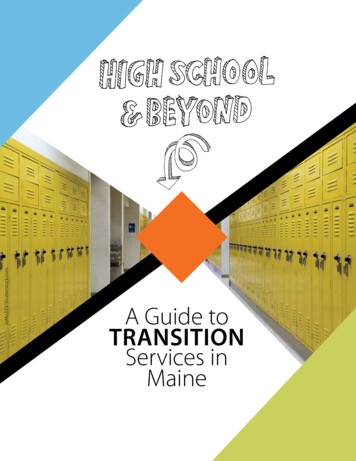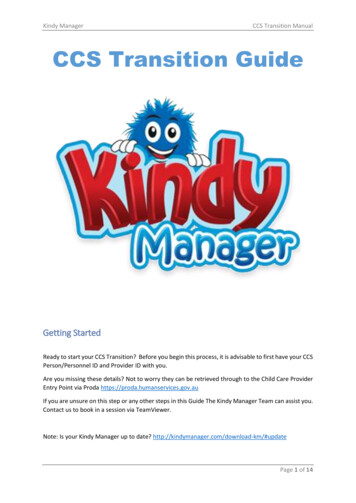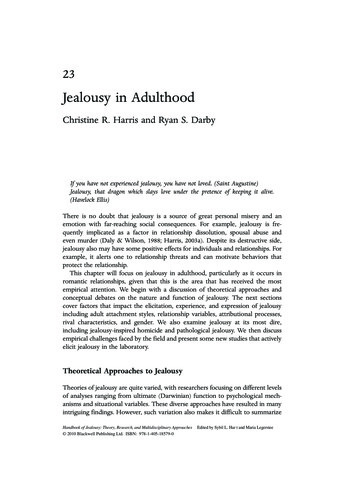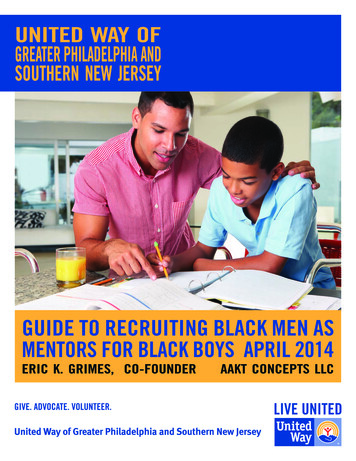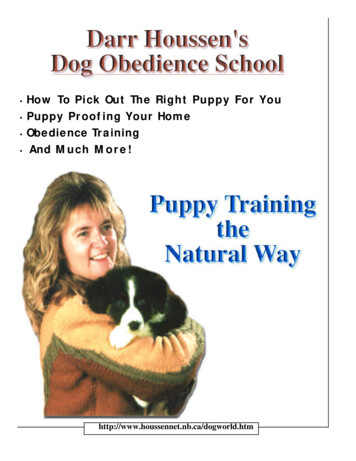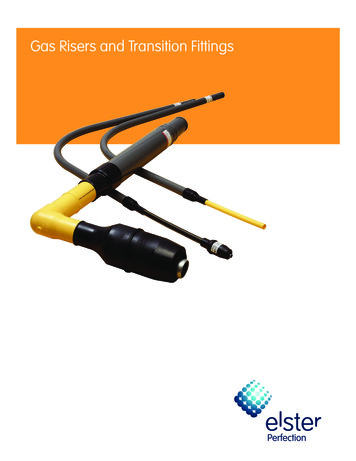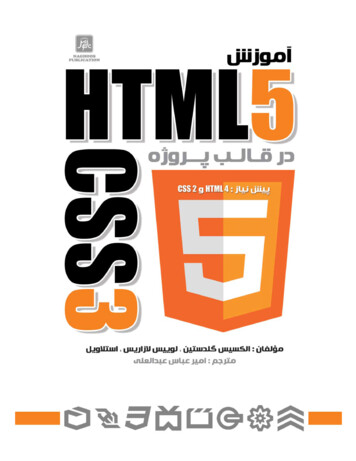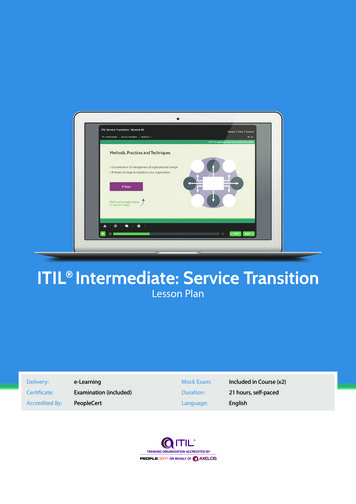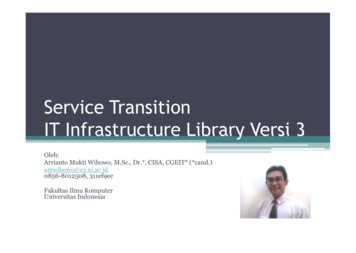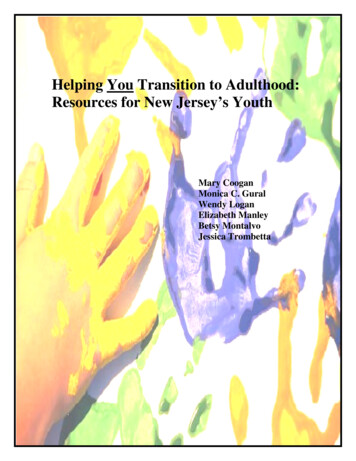
Transcription
Helping You Transition to Adulthood:Resources for New Jersey’s YouthMary CooganMonica C. GuralWendy LoganElizabeth ManleyBetsy MontalvoJessica Trombetta
Table of ContentsAcknowledgements . Page 3Introduction . Page 4PART ONETransitioning: Know How To Make Your Goals and Dreams a RealityChapter 1: What “To Do” Before Reaching 18 Page 5Chapter 2: Transition to Adulthood . Page 13PART TWOEducation and Employment: Discover all the Resources Available for YouChapter 3: New Jersey High Schools, Vocational High Schools, Colleges, andUniversities . Page 17Chapter 4: Academic Scholarships . . Page 20Chapter 5: Employment Opportunities . Page 24Chapter 6: Financial Assistance . Page 25PART THREEAdditional Resources: Do Research to Find What You NeedChapter 7: Medical/Behavioral Health/Counseling . Page 30Chapter 8: Peer-to-Peer and Mentor Support . Page 33Chapter 9: Housing Services . . Page 37Chapter 10: Transportation and Auto Coverage . Page 40Chapter 11: Special Services . . . Page 41PART FOURClosing: Remember That Others Have Made It and So Can YouClosing Remarks . . . Page 46About the Authors . Page 49Page 2
AcknowledgementsWe want to thank the members of the Children In Court Improvement Committee (CICIC) whooffered suggestions and provided us with information for this guide. Your contributions,feedback, and support are truly appreciated! We also want to express our deepest gratitude toJudge Sallyanne Floria for being a dedicated youth advocate and outstanding Chair to the CICIC.In addition, we want to acknowledge the foster care youth groups and Youth Advisory Boardmembers for their help on the information and structure of this guide. We definitely benefitedfrom their help.And finally, we would like to express our thankfulness to the many persons that provideresources and assistance to the young adult population. Thank you for your dedication to makinglife a little easier for our growing youth!Thank you!Sincerely,Mary CooganMonica C. GuralWendy LoganElizabeth ManleyBetsy MontalvoJessica TrombettaThe resource guide is available on the website of the Department of Children and Families rceGuide.pdfPage 3
Introduction“Courage doesn’t always roar. Sometimescourage is the quiet voice at the end of theday saying, ‘I will try again tomorrow.’”– Mary Anne RadmacherDear Young Adult,This New Jersey guide serves as a useful tool to assist you through the transition into adulthood.The information in this guide outlines resources as well as people who are available and willingto help you plan for your future. Ultimately, we want you to reach adulthood successfully!When we were developing this guide there were three main objectives:1.) To support the concept that you are NOT alone as you journey into adulthood;2.) To give you resources that will make your transition into adulthood easier; and3.) To offer useful activities that will help you organize, focus, and make decisionsregarding your future so that you can access the resources you need in a timelymanner.We want to encourage you to believe that YOU ARE more than able to fulfill your dreams,accomplish your goals, embrace new possibilities, and trust the process of growing and learning.As you read through this guide we want you to think about a few things:- What are my immediate needs?- What are my long-term desires?- How can I best use these resources?- After completely reviewing the guide: Where do I go from here?We hope that you find this guide helpful! In addition, if there are any New Jersey resourcesthat are not included in the guide that you would like us to know about please email us at:njyouthguide@live.com. Also, please feel free to email us with your feedback, suggestions,and/or how you used the guide.Page 4
PART ONETransitioning: Know How to Make Your Goals and Dreams aRealityChapter 1: What “To Do” Before Reaching 18Below is a Youth “To Do” Checklist to follow. In this checklist, you will find tasks to focuson/complete based on your age group. For the most part, these tasks are for you to completewhile you are in the age bracket listed below. Some of the tasks might overlap in ages or theymay need to be repeated (which is okay to repeat tasks if you need to).It is important to complete each task in this chapter before you reach age 18. You will find boxesnext to each task. When you have completed the task place a check mark in the box to show thatthe task was done. Some tasks will need you to re-visit them; place a check mark each time youcomplete the task and give dates for when you have placed a check mark for future reference.YOUTH “TO DO” CHECK LISTAges 14 and 15I am Attending School Regularly and I am Supporting a Safe andProductive High School EnvironmentIt is VERY important that you finish school and get a high school diploma. Here aresome helpful tips that will help you graduate from high school. After every markingperiod, look at the tips again to make sure you are following them. Place check marks inthe box above each year to make sure you are attending and participating in school. Monitor your attendance. Attend school regularly – unless you are REALLY sick. Ifyou need to miss a day of school, get a note from your doctor or guardian for theabsence(s). Do your homework, projects, and classroom work. Homework is the easiest part ofyour grade so turn in your homework when they are due. If you are having troubledoing the work talk to your teacher and/or school counselor so that you are notpunished and can get help. Avoid peer conflicts! Avoid peer pressure to use drugs! Avoid getting into fights! Beaware that fights and carrying drugs will lead to suspensions. Conflicts, drug usage,and fights are three things that could appear on your school records that are sent tocolleges when you apply. The use of drugs may prevent you from getting a studentloan. Drugs and violence can keep you from being successful! Be PEACEFUL andDRUG FREE. Respect your teachers and do not fall asleep in class! There are some teachers youmay not like and some of the things you are being taught may be boring. It is veryimportant for you to respect your teachers even if you don’t like what you’re doing,Page 5
this will keep you from getting into trouble and not cause problems for the otherstudents learning, as well as you.Check-in with your school counselor for class scheduling, local internships orvolunteer positions, employment tips, scholarship and college information.Stop bullying! Do not get involved in or accept bullying. If you see someone beingbullied or are bullied yourself report it to your school bullying advocate or counselor.I am Forming/Maintaining Respectful Family RelationshipsA family can be close friends, biological family, caretakers or anyone that is important inyour life. It is important to know who these positive people are to you and how tomaintain these good relationships. To learn about what is cool and what is not cool whenyou meet new people and learn how to build on those relationships visitwww.thatsnotcool.com.I am Surrounding Myself With Positive FriendsIf you are involved with DCPP (formerly known as DYFS) or are homeless you canhook-up with other young people around the state by joining a Youth Advisory Board(YAB). To obtain a list of YABs by county visit www.transitionsforyouth.org or contactAdam Staats by phone at 973-353-5775 or via email at astaats@ssw.rutgers.edu forfurther details. Also, visit www.NJYouth4Youth.org as an additional community networkresource or contact Nana Wilson for details about NJYouth4Youth at 973-353-3007.It doesn’t matter if you are involved with DCPP you should learn about the school andcommunity groups that are active. Ultimately, find out how you can join them in orderfor you to meet new people! One way to do this is by talking to your school counselorabout school clubs and activities or visit your town’s department of recreation website.I am Learning About Healthy RelationshipsYou may start getting involved in romantic relationships. Be aware that there are statelaws that do not allow adults over age 18 to engage in sexual intercourse with a minor.These are called “statutory rape laws” and every state is different in their statutory rapeconsiderations and penalties. For statutory rape laws and penalties by state 03-r-0376.htm.Also, it is important to always respect your partner and yourself. You should always feelsafe and comfortable in your relationship. You have the right to decide how you willmove forward with your relationship. If you are concerned how your partner treats you,you should talk to a trusted adult. You can also contact the National Dating AbuseHelpline, which is available 24 hours a day, at 866-331-9474. All calls and chats areanonymous and confidential. Visit www.loveisrespect.org for further information and tochat online from 4pm-12am CST or please visit www.breakthecycle.org.I am Adopted and Have Entered into the Adoption RegistryPage 6
The Adoption Registry can help you get in contact with your birth family members. Ifyou were adopted in New Jersey through the Division of Youth and Family Services orby its earlier agencies, you may be able get information about your birth family throughthe Adoption Registry. The Adoption Registry can help you get in contact with yourbirth family members and can help you with the following services: registration, nonidentifying background information, limited search services, information and referrals.If you have been adopted and would like information regarding your biological family,complete an adoption registry application. In order to obtain any information you mustbe the age of majority (18) or if a minor then your adoptive parents must give consent.Applications can be obtained from the Registry and should be updated when last names,current address or phone numbers change. To contact the staff of the Registry please call609-888-7474 or email dcfadoptionregistry@dcf.state.nj.us, or for more informationvisit: www.nj.gov/njfosteradopt/adoption/registry/.I am Participating In Volunteer WorkVolunteering is an important way to give back to your community. These opportunitiesmight be un-paid work but you will learn useful skills, expand your social network, andhave something good on your resume. Here are links to volunteer opportunities in lunteerconnectnj.orgwww.volunteernj.orgI Have Identified My Life Goals and Explored Possible CareersVisit www.njnextstop.org to help you learn more about career and work interest in NewJersey. Visit www.oedb.org/ to get descriptions of careers based on degrees. Thiswebsite will also help you to find colleges and universities that offer the degrees thatmatch your career interests. Complete Activity One in this resource guide to identify anddiscover goals, interests, and strengths about yourself. Then complete Activity Three tohelp you in matching the careers that are a best fit for you.I Have Explored the Options of Going to College or PursuingVocational TrainingIt is cheaper for a person to attend a vocational school and it takes less time to begin acareer and full-time employment, as compared to attending college immediately afterhigh school. Working while attending a vocational school is easily possible; and mostvocational programs offer full and part-time schedules. See Chapter 3 “New Jersey HighSchools, Vocational High Schools, Colleges, & Universities” for more details. Inaddition, the private and public post-secondary vocational school database can be foundat the following website location www.rwm.org/rwm/tf newj.html.I am Preparing for the SATsMost colleges require that students take SATs or ACTs as part of their applicationprocess. Everyone should study and take the SATs and ACTs even if they decide not toPage 7
attend college! There are prep classes you can take and practice books you can purchaseto study on your own. Ask your school counselor for additional resources and help. Visitthe following websites to find out about SAT prep courses: www.princetonreview.com,www.number2.com, and www.kaptest.com.If you cannot afford to take a class, you can still study on your own using a prep bookwith sample exams and helpful instructions. Visit the following websites to buy a book toprepare for SATs and ACTs: www.amazon.com and www.barnesandnoble.com. And ifyou are a DCPP (formerly known as DYFS) involved youth, ask your caseworker aboutfunds that may be available to help you with your SAT/ACT preparation.I Have Successfully Completed A Life Skills AssessmentThe Ansell Casey Life Skills Assessment is completed by you and your guardian orcaregiver to identify the life skills you already know and what skills you need helpdeveloping in order to become self-sufficient. The assessment is based on the responsesthat you and/or your caregiver provide. The Ansell Casey Life Skills Assessment isavailable at www.caseylifeskills.org and should be completed each year. The website isopen to everyone and has many resources that you may find helpful.I Have Discussed With My Division of Child Protection andPermanency (DCPP) Caseworker On How I Can Obtain Life SkillsIf you are a DCPP involved youth, talk with your DCPP caseworker about gettinginvolved in your county’s “Life Skills Training Program” and how to be referred.Contact information for county programs can be found at www.transitionsforyouth.org.If you are not involved with DCPP, communicate with your school counselor on how youcan obtain the necessary skills you need to become a productive and successful adult.Some schools have a School Based Youth Service Program (SBYSP) and provide skillstraining. Ask your school counselor about whether your school has a SBYSP.I Have Collected My Working PapersWorking papers can be obtained from your school’s main office. You will need severalsignatures before you can start working. Usually the signatures include a school official,your guardian, your new employer (manager at the job you will start at), and a doctor.You will need new working papers for each job you start while under the age of 18.Ages 16 and 17I am Broadening My Social NetworkIf you are a youth and involved with DCPP, you can go onto national network websitesfor young people in foster care. Visit www.fosterclub.com or www.fostercarealumni.org.Regardless of whether you are a DCPP or non-DCPP involved youth look for volunteeropportunities, community activities, and a chance to join school clubs. Ask your schoolcounselor for opportunities. Also, see Chapter 8 for additional networking websites.Page 8
I Have Found a Job & Know My Employment RightsWorking helps you to look into careers and determine whether you like that area of work.In order to help you get employment, visit a One-Stop Career Center nearest you. To finda career center visit: www.careeronestop.org/ or www.wnjpin.net/oscc/; or find a centerby visiting: op/services.html.To learn more about laws and regulations concerning work hours and wages, s/child labor law.html.I Have Adopted Budgeting SkillsLearning how to budget and manage money is very important. Talk to the trusted peoplein your life about how to budget money. Learn how not to spend more than what you areearning and how to save money. Review “Chapter 6 Financial Assistance” in this guidefor some additional information. Also visit these two websites designed to help you withmoney management: www.moneyandstuff.info/teens.html ew/tabid/403/id/2457/Get-Smartabout-Money.aspxI Have Found a Positive and Influential MentorMentoring programs have been created throughout the state of New Jersey to ensure thatyoung adults transitioning from adolescence to adulthood are receiving positive rolemodels and support. Research local mentoring programs or ask your school counselor. Ifyou are a DCPP involved youth, ask your caseworker to make a local mentoring programreferral for you. Complete Activity Four when you have a positive mentor in your life.I Studied for and Passed My Driver’s Permit TestNew Jersey’s driver education booklets are available at your local Motor VehicleCommission (MVC). These booklets will help you prepare for taking the written driver’sexam. If you have any questions ask your driver’s education instructor, or contact a MVCnearest you. For MVC locations by county please visit: www.state.nj.us/mvc/Location/.I Have Found Programs That Will Help Me Prepare For CollegeIf you are a current or former DCPP involved youth or you are homeless attend “A Nightwith NJFC Scholars Program” which is run by Foster and Adoptive Family Services(FAFS). These events are scheduled year-round and held throughout the state of NewJersey at various housing and life skills programs, high schools, and community centers.During the event FAFS staff provide assistance with completing the free Federal StudentAid (FAFSA) application and the NJFC Scholars Program application. The staff willanswer questions you may have about attending a vocational/technical school, two yearcollege, four year college or university. If you would like more information about theseevents or would like to schedule an event in your area please contact Ebony Dean at 800222-0047 ext. 318 or edean@fafsonline.org.Page 9
You can also speak with your guidance or college/career counselor about college fairs orcollege nights held at your high school or in your area. They are usually held in the fallor spring during the evening hour and often while school is in session.P a g e 10
I am or Was a Division of Child Protection and Permanency (DCPP)Youth and I am Aware of Wraparound Funding and Aftercare ServicesFor youth 18-22, who are currently or were involved with DCPP, investigate “AftercarePrograms.” These programs may help you in getting employment, housing, and post-highschool education when your DCPP case is closed or it is getting ready to be closed.Participating in an “Aftercare Program” may allow a youth to have access to“wraparound funds” for short-term related expenses. See “Chapter 6: FinancialAssistance” for further information about getting “wraparound funds” and therequirements.I Have Selected a Possible Career PathBe true to yourself! Select a career path or several possible career options that youbelieve you will be happy with, and obtain the necessary skills through training andeducation in order to reach your goals. If you decide to attend college or would like topursue further training after high school, start researching schools that offer educationand programs in your area of interest. Links to websites that list different schools andcolleges in NJ can be found in “Chapter 3: New Jersey High Schools, Vocational HighSchools, Colleges, & Universities.”I Shared My Career Interests and Goals with My School CounselorTalking with your school counselor about your education dreams is extremely important.School counselors are responsible for helping you select further educational options andare knowledgeable of the resources that would meet your specific needs. You shouldschedule an appointment with your school counselor to discuss future plans and keep incontact to stay updated on other opportunities available based on your interests.I Investigated Whether I’ll Have Medical Insurance Coverage at 18If you are a DCPP involved youth, talk with your caseworker and/or guardian aboutmedical insurance options between the ages of 18-21.If you are not a DCPP involved youth, investigate if you are eligible to receive medicalcoverage in New Jersey until the age of 26 or 31. For information, visit the Department ofBanking and Insurance website at www.state.nj.us/dobi/division consumers/du31.html.Also, read “Chapter 7: Medical/Behavioral Health/Counseling” for extra information.P a g e 11
ACTIVITY ONE:List your goals and desires:“The discipline of writingsomething down is the first steptoward making it happen.”- Lee Iacocca What are the top five tasks you want to do in the next 5-years?1.2.3.4.5.What are five characteristics that you like about yourself?1.2.3.4.5.What are habits that you need to work on?P a g e 12
What do you like to do (hobbies, recreational activities, etc.)?What kinds of skills are you good at doing?P a g e 13
Chapter 2: Transition to AdulthoodHappy 18th birthday! It is exciting to officially be considered an adult and to be able to worktowards your future goals. Along with all of the excitement there are some new responsibilities.This chapter provides two lists that tell you what CAN and CANNOT be done once you turn 18.Also, please complete Activity Two below by reading the messages in the colorful circles. Thenwrite in each blank circle under the diagram your plan on how you will avoid experiencing thesehardships. Visit appropriate chapters in this guide to assist you.ACTIVITY TWO:HousingBecominghomeless from nothaving a plan fortransitional livingSpecialServicesBeing unaware ofservices that canencourage ahealthy lifestyleThings to avoidexperiencingafter turning 18MedicalCoverageGetting sick andnot being able toaccess proper careor treatmentAcademicPathNot gainingenough trainingand are unable toget employmentReaching povertystatus and havingto live on a veryrestricted budgetFinancialIncomeYour Medical Plan:Your Financial Plan:Your Academic Plan:Your Special Service Plan:Your Housing Plan:P a g e 14
18-Year-Old Guideline ChartsWhat You CAN DO As An18-Year-Old1. Vote in federal, state, and local elections and canserve as a jury memberWhat You CANNOT DO AsAn 18-Year-Old1. Cannot legally purchase or drink alcohol2. Able to be elected for county and local office2. Cannot legally purchase cigarettes or tobacco inNew Jersey3. Can sign a binding contract3. Cannot gamble at a casino4. Legally sue a person(s) or company & can besued4. Cannot keep a criminal record “private”5. Cannot get out of a contract due to age5. Obtain individual medical and dental carewithout legal parental consent6. If DCPP youth, even after signing self out-of-care,can sign up for “Medicaid Extension”7. If were adopted, can access copy of birthcertificate6. Cannot seek DCPP protection or services fromabuse or neglect unless in a DCPP program orhave an “open case”7. Cannot supervise a “learner driver” in anyvehicle8. Cannot enter 21 bars and clubs8. Allowed to obtain a resource family parentlicense and potentially adopt a child9. Register to enter the military service/armedforces without legal guardian consent9. Cannot rent or drive a “rental car”10. Cannot obtain an airline transport pilot’slicense in order to operate an airplane, helicopter,and/or gyroplane10. Get married; get a tattoo, and/or body piercingwithout legal guardian consent11. Buy a lottery ticket12. Obtain an unrestricted drivers’ license13. Can get a Commercial Drivers’ License (CDL)and operate or drive a large passenger vehicle orheavy goods vehicle14. Work hours without age labor law restrictions15. Open a bank account without having a “cosigner”16. Obtain academic school records if leaving orgraduated from the school you attended17. Buy and sell real-estate and stock18. Can professionally study-abroad19. Must file and pay taxes for self20. Create a Will and/or Living Will and canindicate if you want to leave your body forexperimental study or donate organs if when die byage 1821. Legally classified “an adult” in ALL USA statesand will be prosecuted as an adult for any criminalactivity, which may result in going to jail ratherthan a juvenile facilityP a g e 15
JOURNAL PAGENOTES:FEELINGS:THOUGHTS AND IDEAS:QUESTIONS:P a g e 16
ACTIVITY THREE:Instructions: Match the career options with thespecific degree area of study. Place the lettersthat are in front of the career options on theline of the area of study it would be under.Areas of StudyCareer OptionsHealth CareA.) Fashion Design, Interior Design, Photography,Digital Arts, Animation, and more.B.) Avionics, Airframe, Powerplant Maintenance, andmore.C.) Cosmetology, Hair Design, Skin Care, Esthetics,Makeup, Nail Technology, and more.D.) Accounting, Marketing, E-commerce, Admin.Support, Management, and more.E.) Court Reporting, Criminal Justice, Paralegal, LegalOffice Admin., and more.F.) Culinary, Baking & Pastry, Hospitality &Restaurant Management, and more.Arts/Design/FashionLiberal Arts &General cationG.) Elementary Education, Secondary Education, andmore.Criminal JusticeH.) Nursing, Dental Hygiene, Medical Assisting, X-RayTech., Medical Billing & Coding, and more.BusinessAviationI.) English, Sociology, Psychology, Art History,Language Arts, Foreign Languages, Science,Biochemistry, and more.J.) Massage Therapy, Nutrition, PersonalTrainer/Fitness, Holistic Health, Physical Therapy, andmore.K.) Software Development, Networking, IT, WebDevelopment, and more.TradeUnique &Alternative CareersCulinary ArtsBeautyL.) Auto Body Tech., Automotive Tech., Electrician,HVAC, Welding, and more.M.) Animal Training, Casino, Sports Writers,Bartending, Travel Agent, and more Note: Answers to activity three canbe found at the end of this guide.P a g e 17
After Completing Activity Three:What are the top three areas of study you may want to pursue?1.)2.)3.)What are five career options you would like to further research?1.)2.)3.)4.)5.)PART TWOEducation and Employment: Discover all the ResourcesAvailable for YouChapter 3: New Jersey High Schools, Vocational HighSchools, Colleges, and UniversitiesWhat are my education choices? Many youth think about this question. Believe it or not, there aremore schools out there than just your public high school. In this chapter, you will learn different highschool options. You will also learn why it is important to complete high school in order to get agood job. Also, you may get a job that will want you to get more education or training at a college orother community training/vocational program. This chapter might helpful you with knowing where tolook for such educational opportunities.Think about what your goals are and read the definitions to see what you decide to do. Talk tosomeone you trust about your thoughts. You can also call the local school you might like to attendand asked them your questions. They can tell you more about what they have to offer, schedule avisit, and help you make a decision.High SchoolHigh School - a school that usually teaches students in grades 9 through 12. There are also otherschools that provide a high school education such as; Charter and Alternative schools. CharterP a g e 18
schools are public schools that receive state money to teach youth with a similar education.Some of the schools have a different way of teaching youth. You can only attend a Charterschool if you are selected through a lottery drawing. The schools are usually run by a group ofpeople who want to see a change in education. These folks can be your parents or othercommunity members. Each school has different standards and education requirements.Alternative High Schools is a school that covers all educational programs but is taught in adifferent manner than a regular public high school. These programs are for students who are atrisk of failing school or who have not been successful in a general education program. To findout what alternative schools are available in your area, contact your local school district.N.J. State School Directory Find a NJ public school by county or district here:www.state.nj.us/education/directory/“All our dreams can come true,if we have the courage to pursuethem . If you can dream it, youcan do it.” - Walt DisneyN.J. Vocational High SchoolVocational School - a school that teaches youth about different jobs such as mechanics,carpentry, plumbing, and construction. Some teach computer and cooking skills.Some youth will like to learn a job or a trade while in public high school. If you prefer thisoption, look for vocational schools in your area when you are ready to enter high school and afteryou complete high school. New Jersey has 21 counties that have vocational high schools. Mostcounties offer full or part-time programs, as well as two and four-year trainings, to students ingrades nine through twelve. The goal of vocational high school is to prepare students to besuccessful and capable of caring for their well-being.Vocational high schools let you to earn a high school diploma and get on the job trainingexperience. Many vocational high schools offer internships, public education, and other schoolto-career programs that teach youth to prepare for a job skill. Also, many vocational programsallow you to earn college credits while still in high school.Usually there are fewer openings in these types of schools, so it is important that if you areinterested, you look into vocational school programs as early as seventh grade. Usually anapplication needs to be sent in the beginning of eighth grade if you plan to participate in a fouryear program or in the beginning of tenth grade for a two-year program. These schools look atyour grades, attendance and department reports when deciding on who can attend their school.N.J. Vocational High Schools –Find a NJ public vocational school here:www.publicschoolreview.com/state vocationals/stateid/NJP a g e 19
CollegeTwo-year College – is a place where someone can learn about career in two years or complete acerti
Dear Young Adult, This New Jersey guide serves as a useful tool to assist you through the transition into adulthood. The information in this guide outlines resources as well as people who are available and willing to help you plan for your future.
